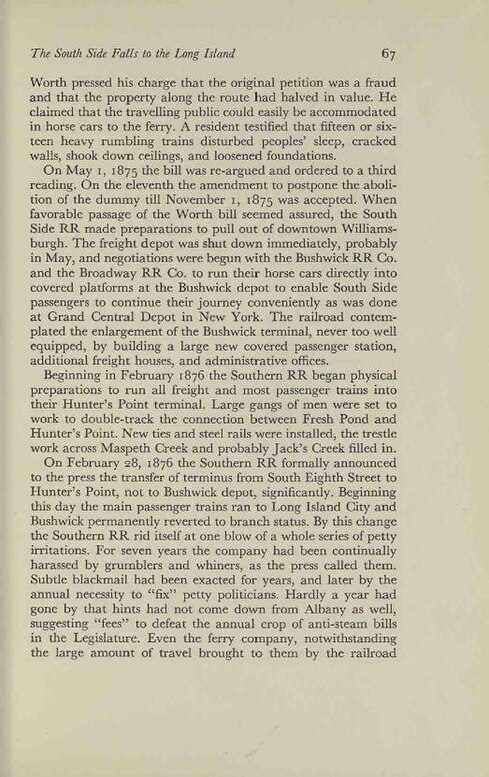Worth pressed his charge that the original petition was a fraud and that the property along the route had halved in value. He claimed that the travelling public could easily be accommodated in horse cars to the ferry. A resident testified that fifteen or sixteen heavy rumbling trains disturbed peoples' sleep, cracked walls, shook down ceilings, and loosened foundations.
On May 1, 1875 the bill was re-argued and ordered to a third reading. On the eleventh the amendment to postpone the abolition of the dummy till November 1, 1875 was accepted. When favorable passage of the Worth bill seemed assured, the South Side RR made preparations to pull out of downtown Williamsburgh. The freight depot was shut down immediately, probably in May, and negotiations were begun with the Bushwick RR Co. and the Broadway RR Go. to run their horse cars directly into covered platforms at the Bushwick depot to enable South Side passengers to continue their journey conveniently as was done at Grand Central Depot in New York. The railroad contemplated the enlargement of the Bushwick terminal, never too well equipped, by building a large new covered passenger station, additional freight houses, and administrative offices.
Beginning in February 1876 the Southern RR began physical preparations to run all freight and most passenger trains into their Hunter's Point terminal. Large gangs of men were set to work to double-track the connection between Fresh Pond and Hunter's Point. New ties and steel rails were installed, the trestle work across Maspeth Creek and probably Jack's Creek filled in.
On February 28, 1876 the Southern RR formally announced to the press the transfer of terminus from South Eighth Street to Hunter's Point, not to Bushwick depot, significantly. Beginning this day the main passenger trains ran to Long Island City and Bushwick permanently reverted to branch status. By this change the Southern RR rid itself at one blow of a whole series of petty irritations. For seven years the company had been continually harassed by grumblers and whiners, as the press called them. Subtle blackmail had been exacted for years, and later by the annual necessity to "fix" petty politicians. Hardly a year had gone by that hints had not come down from Albany as well, suggesting "fees" to defeat the annual crop of anti-steam bills in the Legislature. Even the ferry company, notwithstanding the large amount of travel brought to them by the railroad
